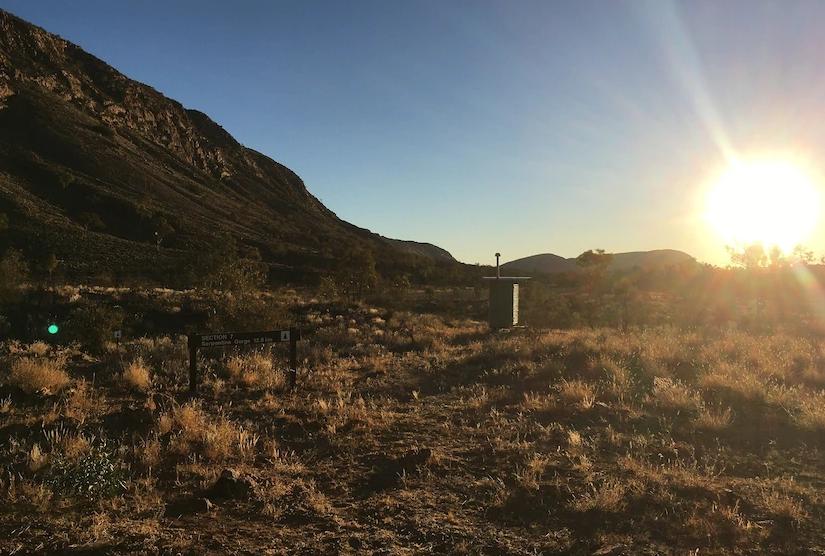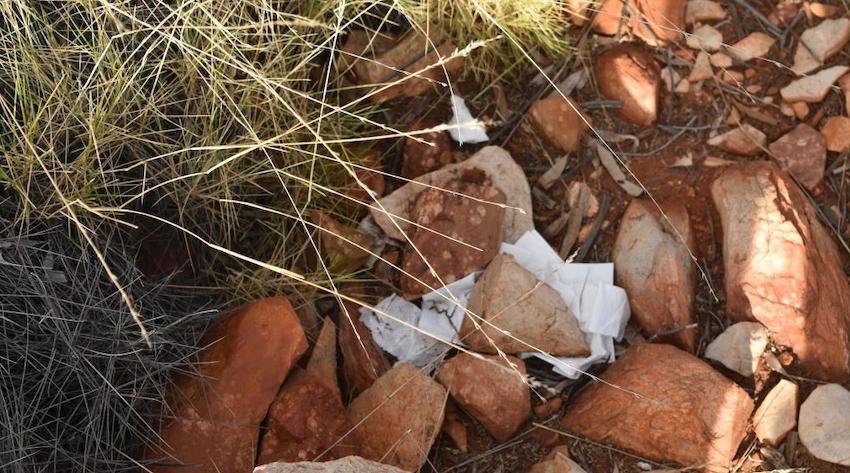The Larapinta Trail near Alice Springs is known for its spectacular views and scenery, but its growing popularity among bushwalkers this year is causing a less impressive sight: deposits of toilet paper.
According to Northern Territory Parks and Wildlife, 2022 promises to be the busiest season for the 230-kilometer trail in the heart of West McDonnell National Park.
“In the first two weeks of July, the number of independent hikers, not including those taking commercial tours, averaged just over 300 people a night,” said NT Parks and Wildlife Director Chris Day.
But seasoned Victorian hiker Michelle Forrer said the amount of toilet paper scattered along the trail in July confused her.
“It was definitely the biggest drawback to my experience on the trail, and I wondered what I could do about it,” she said.
“Some of it may have been dug up by animals, but most of it looked discarded.”
Ms. Forrer said the trail was very busy at the time with “hundreds of people along the trail.”
“For a lot of people, it was their first hike,” she said.
She said education was the key to reducing human impact on the trails.
“The month before I did the Larapinta, I did the Australian Alpine Hiking Trail,” Ms. Forrer said.
“[There wasn’t] a trace of paper, but there are fewer of them, and it’s not popular with beginner hikers.”
leave no trace.
Mr. Day said evidence of human waste on the trail had been an issue for years, but it tended to become more apparent as the hiking season drew to a close.
“One of the things we’ve noticed is that this year the market has probably changed a little bit,” he said.
“There are probably a lot of people who are not what you would call experienced bushwalkers.”
Mr. Day said those visitors may not be aware of the key principle of walking through the woods, which is to leave no trace.
He said there were 16 restrooms along the trail and urged hikers to plan ahead and use the facilities.
“But if you are caught unawares and there is no toilet, it is advisable to move at least 100 meters away from the trail, campground, any body of water or watercourse, dig a shallow hole and bury [waste and toilet paper]. right,” he said.
Mr. Day said another key principle is to be considerate of park owners, such as the traditional owners and staff who look after the trail, as well as other visitors.
FIFO toilets.

NT Parks and Wildlife is in the early stages of planning to install restrooms on some of the higher sections of the Larapinta Trail, with locations approved by the traditional owners and funding not yet secured.
Mr. Day said a big problem is vehicle access to the higher campgrounds, and one solution is to use a helicopter.
“It’s not just a problem of getting in and creating infrastructure at these sites, but also of maintaining it at all times,” he said.
Mr. Day said that using a helicopter to remove trash would not be cheap because the rental cost is $1,500 an hour.
“In fact, it would take more than an hour to fly to service Mt. Saunder,” he said.
Since the toilets are likely to appear in a few years, Mr. Day said it is crucial that the Bushwalkers do the right thing so that nature can run its course.
He said he was fortunate that the Larapinta Trail had time to recover during the hot summer months, giving human waste time to biodegrade naturally.
“Especially if people do the right thing and dig their cat hole away from the trail, it will break down pretty quickly,” Mr. Day said.

